- Home
- A J Waines
Don't You Dare: a heart-stopping psychological thriller Page 2
Don't You Dare: a heart-stopping psychological thriller Read online
Page 2
‘It was just a bit of fun. Carl is…was…’ She licks her lips but doesn’t seem able to put what she has to say into words, or at least not into words she’s prepared to share with me.
‘Peter loves you. He adores you. He’s the one who’s going to help you get started on your career. He’s already given you introductions – he’s serious about it. He knows the right people and could guide you.’ I clasp my hand over hers. ‘We can’t let this ruin all that. Do you understand?’
She opens her eyes wide and gets to her feet. ‘But…’ she stares incredulously at the body, ‘what are we… supposed to do?’
Without warning, she starts wheezing and doubles over, her breathing fast, snatching at the dusty air.
‘Where’s your inhaler?’
Clutching her chest, she points to her bag hanging over the edge of the chair. I grab it and hand it to her. Her asthma is mild and most of the time she has no symptoms, but she’s rarely without her medication. She shakes the inhaler and takes a dose, then leans forward, her hands on her knees.
I stroke her back, getting her to sit. ‘You’re going to be fine. That’s it…nice and slow…’
She nods, gradually recovering, her breathing easing.
‘I’m alright…’ she says, squeezing my hand sharply twice. It’s been our signal since she was tiny that she’s going to be okay.
I let out a breath and think for a moment. ‘We have to carry on as normal,’ I say. ‘We must pretend this didn’t happen and your marriage to Peter will go ahead as planned.’
She blows out a rush of air. ‘Really? But what about…?’ She blinks fast and points to the body.
I bite my lip. ‘Leave it to me,’ I say.
3
Rachel
I have no idea what to do next.
I may have sounded gung-ho and self-assured, but to be honest I’m bluffing. I only know I can’t think straight with a corpse so still and larger than life right next to us. I need to get him out of the way so I can work out some kind of plan. Besides, the decorators are starting work in the toilets tomorrow morning and all their paint gear is lying only a few feet away. We have to get Carl out.
Thankfully, the CCTV cameras at the back of the pub are either faulty or missing, due to be replaced as part of the refurbishments, so no electronic eyes will be watching us. What we need to do next, without any fuss, is go home and collect the car.
I instruct Beth to put her jacket and gloves on and grab a rag that’s been left drying over a bucket. I’d taken one glove off briefly when I checked Carl’s pulse, but instinct had told me to put it back on again. While Beth slips her arms into her jacket in a daze, I’m wiping down the chair, the small table, the tap of the cask.
‘Did you or Carl touch anything else?’
‘The door,’ she says, turning round, ‘the lamp…’
I wipe the door handle on both sides, the door itself, the plug socket for the lamp and the main light switch, too. Then I complete a circuit of the place, rubbing down everything they could have touched, before stuffing the rag in my pocket.
‘Okay, let’s go.’
‘We’re leaving him?’ she says aghast.
‘Only until we’ve got Marvin’s car. We’re coming straight back.’
It feels desperately precarious leaving him there like that, but we won’t get far with him without a vehicle. Thankfully, Marvin, the pub landlord, left the car keys in my ‘capable’ hands, together with overseeing the refurbishments while he’s away.
Beth looks like she’s sleepwalking as I guide her out of the back door and lock it behind us. I take an odd route home, avoiding the streets where friends live. It’s probably a futile gesture; as a barmaid in a popular pub, it’s rare for me to walk through the city without being recognised. Our saving grace is it’s raining again, so I slip my umbrella out of my bag and we huddle underneath it, keeping our heads down all the way back.
Beth goes straight to the passenger door of Marvin’s Skoda, but I beckon towards the house, first. Something has occurred to me.
She sits at the bottom of the stairs with her head in her hands, while I open the laptop and check the City Council website for a list of CCTV cameras. I’m thinking ahead. We can’t afford to be picked up on a camera somewhere.
There are over three hundred council-run cameras in the area, so with a map of Winchester beside the laptop, I sketch a route between our house and the pub, avoiding every single one of them. It doesn’t account for any private cameras, of course, but I’m hoping these will be aimed at conservatories, porches and garages, not at the roads.
Only then do we return to the pub. I pull up close to the back exit which, I hope, will be out of sight due to the row of sturdy cypress trees along the edge of the beer garden and I lead the way to the cellar door.
Beth stiffens once I’ve unlocked it. She’s deathly white and hangs back at the top of the steps. I take her wrist, firmly.
‘I can’t do this on my own,’ I tell her. I give her shoulders a squeeze; half-hug, half-bolstering to get her moving again, then flip on the light. ‘Keep your gloves on.’
She creeps down after me and waits limp and silent beside the body.
‘You take his feet,’ I instruct and bend down to lift his head and shoulders. The only way I can do it is if I imagine he’s a heavy sack of potatoes. He’s too heavy for us and instead of carrying the body, we drag and hump it up the steps into the main bar.
‘We’re going to need something to hide him,’ I tell her, thinking aloud, seeing only torn dust sheets and flimsy strips of cardboard around the place.
Beth speaks for the first time. ‘The rug…’ she mutters.
Minutes later, we drag him outside and straight into the boot of the car. His body is more manageable now that he’s rolled up in the threadbare oriental rug from the fireplace. It’s still raining hard and I’m not sure if that’s a good or bad thing, but perhaps it means fewer people will be about.
In order to get him in, the back seats have to be folded down and, once the bulky load is laid flat, his feet are clearly sticking out of the end. I pinch a dust sheet from the lounge area to cover them and we add boxes of crisps beside his head and an upturned bucket halfway along to make the bundle more of a hotchpotch.
I go back to the cellar to grab the lamp, too. It’s not going back where Beth found it. It’s going to go straight in a bin somewhere. I don’t want it anywhere near me. I’d never be able to switch it on again, without seeing the vision that greeted me tonight.
Beth is mute the entire time, doing what I ask of her without question. She seems to have accepted my argument that if the facts of the situation come out, her marriage to Peter would be over and, with it, the chance of getting a foot in the door of her beloved career. It appears sufficient to persuade her to go along with me.
When we are certain the body is disguised as much as possible, I drive us to the south of the city to the late-night supermarket for a handful of random provisions. I fold the receipt carefully and tuck it into my purse. It will give us a reasonable explanation for using Marvin’s car that night, if anyone asks.
We have only three more days before Marvin comes back. As his trusted ‘number two’, he’s expecting me to pick him up at the airport on Sunday.
On the return to our house on Barnes Road, Beth spots a skip outside a community centre, so I pull up at the kerb and wedge the lamp down the side of it, under planks of wood and next to a broken toilet bowl.
‘Once we’re parked just get out of the car and walk straight up the path,’ I tell Beth, as I draw up outside the house. ‘Don’t look inside the car, don’t do anything. I’ll bring in the shopping.’
Beyond this point, I still don’t have a plan – not yet. So, I decide to speak to the one person who would understand, as soon as it gets light.
When I wake before dawn, it’s still raining as though it’s never stopped. I’ve spent the night in and out of patchy troubled sleep, all the while feeling like a
black sickness is swallowing me up.
I leave Beth a note by her phone, in case she flies into a panic at finding me gone when she wakes. I tell her to stay where she is and not speak to anyone. Beth is barely able to last an hour without making contact with one of her huge circle of friends, so it’s a tall order. I suggest she bakes a cake. Baking is one of the few jobs around the house she’ll do without kicking up much fuss and it will keep her occupied. I throw on my anorak and hurry towards St Andrew’s Church.
I speak to Russell every day, even though he’s been dead for ten months. He died of pancreatic cancer two days before my thirty-eighth birthday last year. We’d been together for thirteen years. Usually, I chat in person at his grave, where I sit cross-legged on the grass or on a nearby bench under a cedar of Lebanon.
Beth only knew him as a tenant in the same house, renting a room like we did. She misses him, but not like I do. She never regarded him as a parental figure, more as a kind of good-humoured uncle and he, in turn, never tried to be her dad. He always understood we were ‘Rachel and Beth united’. It means the grief is largely mine and because I don’t want to fill our home with misery, I go to the churchyard alone to give a private voice to my loss.
Russell’s grave lies between that of someone called Margo Rand, who made it to seventy-one, and a man called Raphael Dubois, who passed away at the age of thirty-three. At first, I liked to think Raphael was an angel sent to his side to keep watch over Russell until Father Roland told me Mr Dubois was a night-club owner who died of alcohol poisoning.
Before I tell him about the dreadful thing I’ve done, I scan full circle to check there’s no one about who’s going to overhear me. I needn’t worry. It’s barely light and I’m the only one here. I stand at the foot of his grave in the damp grass. I always imagine it’s the foot of his bed and he’s lying quietly, having woken from a short nap. Judging by the way the stones have aged, the earliest graves are situated at the front and I’m behind the church in the more recent patch, the headstones dating from around 1960.
I let him know I’m here, but I can’t seem to get any further. I’m thinking about Beth and whether it was a mistake to leave her on her own with Carl’s dead body flat out in the car outside the house. She might do something rash in a bid to ‘try to help’.
The horror of what we’ve done – I’ve done – momentarily takes my breath away. Failing to report a crime is one thing, concealing it another. What was I thinking? What am I thinking? I wonder if it’s not too late to come clean, but deep down I know it’s not an option. We’ve already gone too far.
Renewed vigour in the rain makes me get on with it and I blurt out my dilemma to Russell’s speckled headstone, letting the wind carry my words into the trees.
‘We’re in a terrible mess, Russell. I thought if I slept on it an idea would come to me by morning, but it hasn’t. I don’t know what to do with the body.’
Russell joined us when Beth was ten years old. I could no longer make ends meet with my income from the pub and had to persuade Beth to give up her bedroom for the tiny box room. I remember her being unaccountably gracious about it. I was so proud of her.
Russell was the first person to reply to my ad in the local paper and I liked him straight away. A mellow smile never left his face during that first visit, but more significantly, he brought along a bunch of fresh daffodils. He stood on the doorstep hiding them behind his back when I answered the door, as though we were on a date. I’ll never forget that gesture.
It seems such a long time ago.
‘Send me a sign, darling – anything, so that I can sort out this dreadful mistake.’
I take a walk along the edge of the grass under the sycamore trees and bring memories of Russell to the centre of my mind.
Shortly after he died, I found gifts he’d bought tucked away in little hiding places around the house. There were earrings and necklaces and collections of my favourite lingerie, all items I’d pointed out to him during dreamy, fantasy moments while we’d been window shopping. He’d bought them all, wrapped each and every one ready for future anniversaries, each purchase extending the bottomless coffers granted by one of his magic credit cards.
The gift destined for my birthday was a silver locket hidden in a drawer in his bedside cabinet, a box wrapped in pink tissue paper with a tag saying, ‘To my darling Rachel’ with a wonky heart drawn around the words. He always used tissue paper to wrap his gifts. There are wads of it still left in the cupboards he used and whenever I hear the distinctive crackle of it, it makes me well up.
I come to a stop at the point where a patch of crocuses have claimed the grass and wait, in the hope that Russell will have engineered some kind of message in the material world for me to see.
A bird drifts high in the smouldering sky over the clock tower, a lorry putters from the high street, but all else is still and there’s nothing drawing my attention in any direction. I listen for words to come into my head, an instruction of some kind, but I know it’s stupid.
A figure all in black with a white collar comes out of the main entrance to the church and pours water from a vase down the nearest drain. Father Roland, the parish priest, raises his hand as he sees me. He addresses me by my first name, these days, as I come to the church so often. Not for services – that would be stretching things too far – but to tidy the graves and do a spot of gardening in the few hours a week I have when I’m not working at the pub. It makes me feel like I’m looking after Russell and helps to distract me from the gigantic hole he’s left in my life.
I like plants anyway and might well have been a florist, owned a garden centre or a vineyard in the south of France if getting pregnant at fifteen hadn’t flung me down the road of motherhood. Beth doesn’t know how lucky she is with her training in drama school behind her and a marriage to a highly respectable man lined up. That bloody drama training was expensive. I saved long and hard to put her through that.
Father Roland disappears and, in the distance, the high street is starting to come to life and I know this is pointless. I’m hoping a spark of inspiration is going to hit me, when it’s clear Russell can’t help me with this one. I’m on my own and I need to get back to Beth. I turn and whisper a hasty goodbye to the headstone and head for the rear gate.
On the way, I pass the most recent interments, where flowers still languish in their plastic wrappers. At the end of the row, there’s a fresh mound of loose soil where the latest burial has taken place. As a child, I remember asking my mother why there was always too much earth to fit back into the hole and she reminded me that it was because there was now a big box down there, taking up space.
Someone has left white lilies on this final mound, but the stems are too long for the glass jar, so it has tipped over, draining away all of the water. As a result, the flowers are limp and starting to curl. Small things like this make me tearful, so I take the empty jar to the standing tap along the path and fill it.
As soon as I nestle it into the crumbling earth, I know what we have to do.
4
Beth
June – nine months earlier
‘Is he here yet?’ he asks me.
Gerry started as a floor runner here a week after me and we always watch each other’s backs. There’s so much to learn and so many ways to make mistakes. And runners get blamed for everything.
‘Yes, he’s with Gloria, having a quick chat before she sends him up,’ I tell him.
I check my notepad – the one that’s glued under my arm at all times. I’d be stuffed without it. It tells me Peter Roper, a film producer, is being interviewed this morning for a documentary about dance in films. I’m meant to get him a coffee before he goes in. That’s not top of my list, however – I’ve got eleven more tasks to fit in first.
I run for the stairs. I need to clear room seventeen on level three. There’s just been a post-production meeting up there and papers have been left strewn everywhere. I must empty the bins, collect Millie’s dry cleaning,
put sandwiches together for the casting crew in room five, not forgetting Donald’s chair, which needs to be fixed before 1 p.m. He has a weird way of sitting on it, twisting it to one side all the time. It’s the second chair he’s managed to ruin in the six months I’ve been here.
Working at the TV company is meant to be a stepping stone; just temporary. It’s not the normal route for an actor, but enough people in the know suggested it’s worth a try and I’ve got to the point where I’m low on options. Twelve months out of drama college and not one sniff of a part. The plan was to earn some cash while finding myself in the right place at the right time to get my ‘big break’.
I know it’s a long shot, but I certainly have more chance of being ‘spotted’ here, than if I’m lying on my bed all day, learning lines for auditions. Craig, from college, was a runner for only three weeks before he bagged the lead in a national ad. The casting guy took one look at him as he handed out the coffees and said, ‘Can you stand over there and look like a gladiator?’ and Craig was in.
I don’t want to reflect on the fact that nothing remotely lucky like that has happened to me and I’ve only got two months left for something earth-shattering to turn up. London is too expensive and by August I’m going to have to move back in with Mum and rethink everything.
My phone bleeps with an instant message. It’s Gloria. She wants me to meet our guest at the lift in five minutes to ‘keep him entertained’:
Sorry, going to be longer than we thought. A hold up in the studio. Problems with the camera track and Margaret’s been taken ill. Might be a while.
Shit! Margaret is the interviewer. We could be in for a long coffee break. I hope Mr Roper is in a good mood.
I scoop a scattering of Kit-Kat and Twix wrappers into the bin, then swap it for the bin in the room next door. I haven’t time to take the rubbish to the canteen.

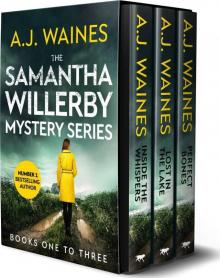 Dr Samantha Willerby Box Set
Dr Samantha Willerby Box Set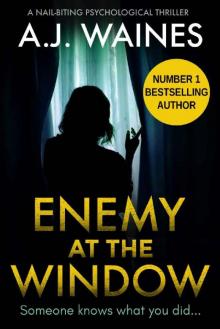 Enemy At The Window
Enemy At The Window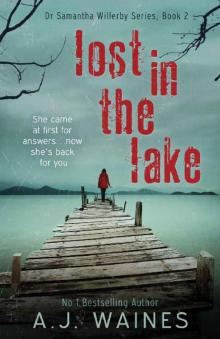 Lost in the Lake
Lost in the Lake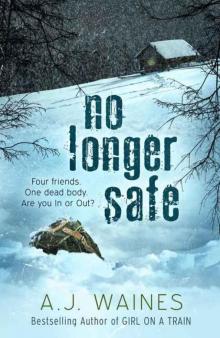 No Longer Safe
No Longer Safe![Inside the Whispers (Dr Samantha Willerby [Chilling Thriller] Series Book 1) Read online](http://i1.bookreadfree.com/i2/04/11/inside_the_whispers_dr_samantha_willerby_chilling_thriller_series_book_1_preview.jpg) Inside the Whispers (Dr Samantha Willerby [Chilling Thriller] Series Book 1)
Inside the Whispers (Dr Samantha Willerby [Chilling Thriller] Series Book 1)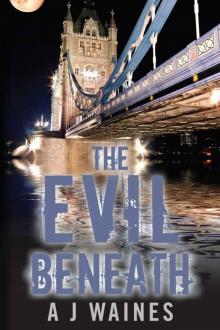 The Evil Beneath
The Evil Beneath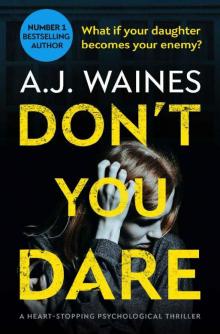 Don't You Dare
Don't You Dare